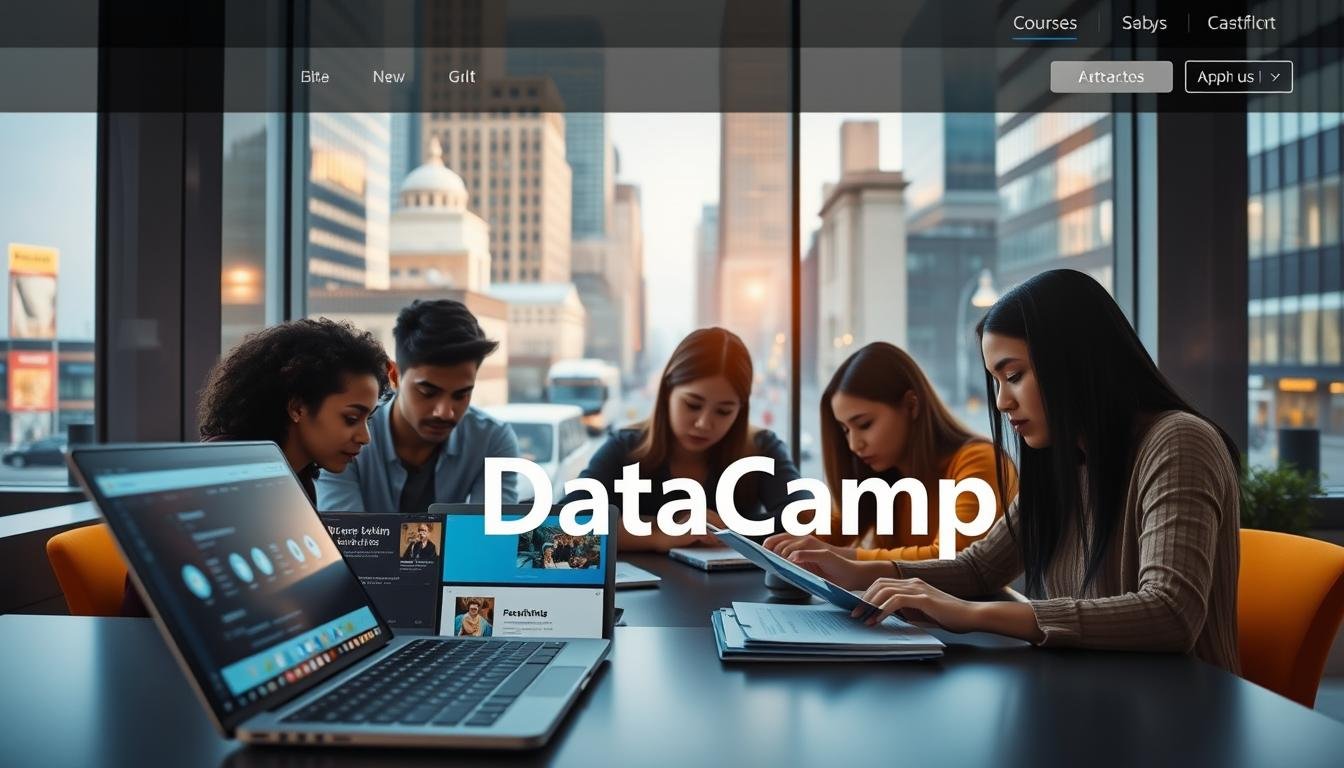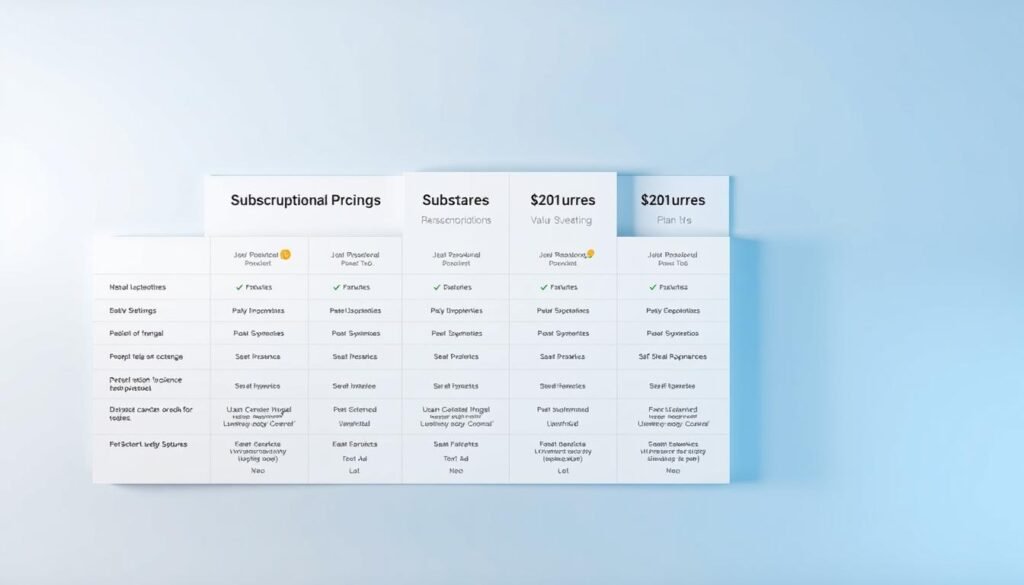Ever wondered how to break into the fast-growing field of data science without spending years in school? With technology evolving rapidly, mastering in-demand skills like Python, R, and machine learning is now more accessible than ever. That’s where an online learning platform like DataCamp comes in.
DataCamp offers a hands-on approach to learning, with over 500 courses covering programming, analytics, and AI. Whether you’re a beginner or a professional looking to upskill, their interactive lessons help you get started quickly. The platform even features structured tracks, like the 94-hour Data Scientist program, to guide your journey.
What sets DataCamp apart? Instead of passive lectures, you’ll solve real-world problems through coding exercises. This practical method ensures you gain job-ready skills fast. Ready to explore how this platform can accelerate your career?
Key Takeaways
- DataCamp provides interactive courses in Python, R, and machine learning.
- Over 500 courses and structured learning tracks are available.
- Hands-on exercises help build real-world data science skills.
- Suitable for beginners and professionals looking to upskill.
- Flexible learning fits into busy schedules.
What is DataCamp?
Since its launch in 2013, this platform has redefined how professionals learn data analytics. Founded by Belgian entrepreneurs, it offers 500+ courses in Python, R, and AI through a unique browser-based coding environment.
The interactive learning website focuses on hands-on practice. Learners solve real problems, building skills faster than traditional methods. Structured career tracks guide users from beginner to advanced levels.
Students, instructors, and corporate teams all benefit from self-paced lessons. Daily challenges and real-world projects reinforce learning. This approach ensures practical development for diverse career goals.
How DataCamp Works
Structured learning meets hands-on practice in this unique approach. The platform’s four-phase system—Learn, Practice, Apply, Assess—ensures you build skills efficiently. Each step is designed to reinforce knowledge through code and real-world tasks.
Learn: Structured Courses
Short videos introduce concepts, followed by immediate exercises. Courses last 2–4 hours, breaking complex topics into bite-sized lessons. This structured learning approach keeps you engaged without overwhelm.
Practice: Daily Challenges
Reinforce skills with coding challenges. These exercises adapt to your progress, ensuring you master each concept. Daily practice turns theory into muscle memory.
Apply: Real-World Projects
Build a portfolio with projects using actual datasets. From analyzing sales trends to predicting stock prices, you’ll solve problems professionals face. This phase bridges the gap between learning and doing.
Assess: Skill Tracking
Personalized dashboards track your strengths and gaps. Quizzes and skill assessments highlight areas to improve. It’s like having a progress map for your learning platform journey.
- Instant feedback on coding tasks accelerates mastery.
- Projects mimic real job scenarios for career readiness.
- Adaptive challenges keep skills sharp.
DataCamp’s Features and Benefits
Interactive features transform theoretical knowledge into practical expertise. The platform combines an intuitive interface with career-focused tools to help users master data analysis and machine learning. Whether through its app or desktop version, learners gain flexibility without sacrificing depth.
In-Browser Coding Environment
No installations or setups are needed—just open your browser and start writing code. The built-in IDE supports Python and R, making it ideal for beginners to learn code seamlessly. Instant feedback on syntax errors accelerates the debugging process.
Structured Learning Paths
Choose from role-specific tracks like the 47-hour data analysis program. Each path breaks down complex topics, such as data visualization or machine learning, into manageable steps. Progress dashboards keep learners motivated.
Interactive Exercises
Practice with real datasets to build job-ready skills. Exercises adapt to your level, reinforcing concepts like data visualization through immediate application. This approach bridges the gap between theory and real-world scenarios.
Certificates of Completion
Earn LinkedIn-sharable certificates by finishing courses or tracks. These credentials validate your ability to learn code and apply it professionally. The app lets you track requirements and download certificates on the go.
Pricing and Plans
Understanding pricing options helps learners maximize value while mastering data skills. The platform offers tiered plans to fit individual budgets and goals, from free introductory lessons to advanced team packages.
Basic Plan (Free)
The free tier provides access to first chapters of courses, ideal for testing the platform. However, advanced data projects and certificates require upgrading. It’s a low-risk way to start coding.
Premium Plan ($25/month)
For $25 monthly (or $149 annually with student discounts), users unlock all 500+ courses. This tier saves time with full access to code exercises, projects, and career tracks. Annual subscribers gain 30% savings.
Team and Enterprise Plans
Businesses benefit from custom pricing, collaboration tools, and progress analytics. Enterprise plans include admin dashboards to track team data skill development. Compared to bootcamps, these options offer better value for scalable learning.
Course Offerings and Skill Tracks
From foundational concepts to advanced analytics, the platform offers skill tracks for every learner. Whether starting with Python data basics or mastering machine learning models, structured paths ensure steady progress. Initial assessments help identify knowledge gaps for personalized recommendations.
Beginner Courses
The 15-hour Python Fundamentals course introduces syntax and data structures through interactive exercises. New learners practice with real datasets, building core skills like data cleaning and visualization. Similar starter tracks exist for R programming and SQL.
Intermediate and Advanced Tracks
After mastering fundamentals, the 44-course Statistics curriculum deepens analytical thinking. Specializations like time-series analytics or neural networks use industry case studies. Courses update quarterly to include emerging tools like PyTorch.
Popular Career Tracks
The Data Analyst with R track (64 hours) covers everything from ggplot2 to Shiny apps. For Python data roles, the 82-hour Scientist track includes pandas and scikit-learn. Both paths culminate in portfolio-ready projects.
- Machine learning paths with TensorFlow and NLP modules
- Skill assessments benchmark progress against industry standards
- New courses added monthly on trending topics like AI ethics
Pros and Cons of DataCamp
Evaluating an online learning platform requires balancing strengths and limitations. While interactive courses accelerate skill-building, some gaps may need external resources to bridge. This analysis helps learners decide if the platform aligns with their goals.
Advantages for Skill Development
The platform excels in structured learning, breaking complex topics into manageable steps. Beginners benefit from instant feedback on coding exercises, building confidence in real-world projects early in their learning journey.
Accessibility is another strength. The browser-based interface lets users practice Python or R without local setup. Self-paced courses fit busy schedules, making it a practical way to upskill.
Limitations to Consider
Hands-on experience has boundaries—learners miss Git integration and command-line practice. Projects use simplified environments, creating gaps between coursework and production settings.
Supplemental training is often needed for deployment or version control. Compared to university programs, some advanced content lacks depth in theoretical foundations.
- Structured curriculum ideal for newcomers but may feel restrictive for advanced users
- Immediate project feedback contrasts with limited IDE customization
- Career tracks omit version control training, requiring external tools like GitHub
- Supplement with local IDE practice for job-ready environment familiarity
User Experience and Learning Journey
Navigating an online learning platform effectively requires understanding its user journey and interface design. A 308-hour case study shows learners averaging 8 completed career tracks when following structured paths. This highlights how intentional design accelerates machine learning and data skill mastery.
Most certifications require 50-80 hours of study, with progress tracking tools helping manage time. The mobile app mirrors desktop functionality, letting users practice Python packages during commutes. However, complex machine learning projects often benefit from larger screens.
Community forums see 73% engagement rates among active users. Weekly challenges and peer code reviews create accountability. This social layer reduces drop-offs at intermediate job-focused courses like Data Engineering.
Personalization drives completion rates. The system adjusts recommendations based on exercise performance—for example, suggesting pandas tutorials after detecting DataFrame struggles. Adaptive learning paths help 68% more users finish advanced tracks.
Common hurdles include statistical theory modules and deploying packages like TensorFlow. The platform counters this with bite-sized examples and pre-configured coding environments. These UX decisions keep the median completion time at 47 hours per specialization.
Career and Professional Development with DataCamp
Building job-ready skills is just the first step—turning them into career success requires strategic professional development. The platform equips learners with tools to transition from coursework to real-world roles, whether aiming to become data analysts or machine learning engineers.
Job Readiness Through Structured Tracks
Role-specific tracks align with industry demands, like the 82-hour Data Scientist program. Over 60% of alumni report landing jobs within six months of completion, citing hands-on projects as key interview talking points.
Certificates validate skills for employers, with LinkedIn integration boosting visibility. Hiring partners like IBM and Spotify prioritize candidates with completed professional development tracks.
Building a Standout Portfolio
Projects range from sales analysis dashboards to predictive models, mirroring real business challenges. One graduate’s COVID-19 trend visualization project led to a Fortune 500 internship.
The platform’s guided projects include datasets from NASA and Twitter, ensuring portfolios demonstrate relevant data scientists’ workflows.
Networking and Community Growth
Weekly challenges and peer reviews foster connections among 12 million users. Alumni events and LinkedIn groups help learners become data professionals with industry contacts.
Corporate training adoption has grown 140% year-over-year, expanding access to employer networks. Certificates correlate with 22% higher starting salaries, per a 2023 survey.
Alternatives to DataCamp
Exploring other learning platforms can help you find the best fit for your goals. While DataCamp excels in hands-on coding, competitors offer unique strengths like university-backed credentials or specialized programming tracks.
Coursera
Coursera partners with top universities to deliver structured courses. Its certificates carry academic weight, ideal for career changers. However, costs vary—some specializations exceed $50/month.
Codecademy
Focused on skills like Python and web development, Codecademy’s interactive IDE suits beginners. Its free tier is robust, but advanced content requires a $20/month Pro membership.
Udacity
Udacity’s nanodegrees (from $399/month) emphasize job-ready development in AI and data engineering. Mentorship and project reviews boost outcomes, with reported 75% job placement rates.
- Depth: Coursera’s university ties vs. Udacity’s industry partnerships
- Pricing: Codecademy’s affordability vs. Udacity’s premium model
- Niche focus: Combine platforms for full-stack data skills
Conclusion
Mastering data science requires the right mix of theory and practice. This platform suits beginners and professionals seeking hands-on learning with real-world projects. Its interactive approach builds job-ready skills efficiently.
For $25/month, the value outweighs costs—especially with annual discounts. To maintain expertise, revisit advanced modules and supplement with external tools like GitHub.
While the platform excels in coding practice, it lacks depth in theoretical foundations. Pair it with university courses for comprehensive mastery.
Recommendation? Ideal for self-starters prioritizing practicality over theory. Explore free chapters first to test fit.
FAQ
What kind of courses does DataCamp offer?
The platform provides structured courses in data science, machine learning, Python, R, and SQL. Topics range from beginner fundamentals to advanced analytics and data visualization.
Is there a free plan available?
Yes, the Basic Plan offers limited access to free courses, exercises, and the first chapter of most skill tracks. For full content, upgrade to Premium.
How does the in-browser coding environment work?
Learners write and execute code directly on the platform without installing software. This hands-on approach reinforces skills through real-time feedback.
Can I earn certificates for completing courses?
Yes, certificates of completion are available for paid plans. These validate skills in data analysis, programming, or machine learning for resumes or LinkedIn.
What career tracks are popular on DataCamp?
Data Analyst, Data Scientist, and Machine Learning Scientist tracks are top choices. Each includes projects to build job-ready portfolios.
How long does it take to finish a course?
Most courses take 4–10 hours, depending on complexity. Skill tracks require 20–60 hours, blending videos, exercises, and real-world applications.
Are there alternatives to DataCamp?
Yes. Coursera offers university-backed programs, Codecademy focuses on coding basics, and Udacity provides nano-degrees with mentor support.
Does DataCamp help with job placement?
While it doesn’t guarantee jobs, the platform sharpens technical skills and offers portfolio projects to boost employability in data-driven roles.








